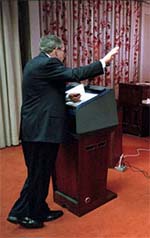 |

|
|
Abstinence Education Funding |
| Kaiser Daily HIV/AIDS Report
Bush to Ask Congress for 33% Increase in Abstinence Education Funding in 2003 Budget
Federal funding for abstinence programs comes from several sources, including the 1996 Welfare Reform Act, the 1981 Adolescent Family Life Act and HHS grants. The Welfare Reform Act, which is up for reauthorization this year, granted $50 million per year over five years to states for the provision of abstinence education. Programs funded with this money may not discuss "the benefits" of contraception. However, many states were "[u]ncomfortable" with the restrictions on the programs and instead used the funding to provide "pro-virginity media campaigns" or after-school programs that "make little if any mention of sex or abstinence," the AP/Nando Times reports. Some conservative lawmakers "complained that states were dodging the intent" of the abstinence programs and created a new fund for abstinence education that consists of grants distributed directly by HHS. Programs funded through the HHS grants "overtly discuss the value of not having sex." The administration's proposed funding increases for next year are found in the HHS program. The administration's total funding request for abstinence programs is broken down as follows: $50 million through the Welfare Reform Act, "at least for the first year," a consistent level of funding with this year; $73 million in HHS grants, an increase of $33 million; and $12 million through the Adolescent Family Life program, the same as this year (Meckler, AP/Nando Times, 1/31). Religious Activists Protest Free Condom Distribution at 2002 Winter Olympics Religious activists and antiabortion demonstrators have begun protesting the Salt Lake Organizing Committee's decision to make free condoms available to athletes residing in the Olympic Village at the 2002 Winter Olympic Games in Salt Lake City, the Associated Press reports. Cardinal Health, the official drug supplier for the Olympics, donated 12,000 condoms to the village, whose residents began arriving this week, and the SLOC will make the prophylactics available for free at first-aid stations. Brandi Swindell, director of the antiabortion group Generation Life, said that condoms are not "100% reliable" and "only promote sexual promiscuity" and called the organizing committee's decision to condone free condom distribution within the village "morally offensive" and "appalling." However, SLOC spokesperson Caroline Shaw said that the availability of condoms helps promote the games' goal of ensuring the safety and health of athletes. "We consider it a good public health practice," she said. Adam Glickman, CEO of the Los Angeles-based condom store Condomania, stated that the protesters are "missing the boat," adding, "Condoms, when distributed with educational material, have been shown to decrease sexual promiscuity." The International Olympic Committee does not require condoms be supplied to athletes, and none were distributed at the 1998 Winter Olympics in Nagano, Japan. However, at the 2000 Summer Olympics in Sydney, Australia, the free condoms were "such a hit" among village residents that organizers had trouble meeting the demand. Swindell stated that her group feels the Olympic Games should be focused on "unity and sportsmanship" among athletes rather than "recreational sex ... even safe sex." But the Associated Press reports that the popularity of free condoms in the Sydney Olympic Village was largely attributable to a lack of access to high-quality condoms in many countries and not to extensive sexual activity among village residents during the games (Associated Press, 1/30). This summary is from the Kaiser Daily HIV/AIDS Report http://www.kaisernetwork.org/dailyreports/hiv) provided by http://www.kaisernetwork.org), a free health policy news summary and webcasting service of The Henry J. Kaiser Family Foundation. The Kaiser Daily Health Policy Report is published for kaisernetwork.org by National Journal Group Inc. © 2001 by National Journal Group Inc. and Kaiser Family Foundation. All rights reserved." |

© 1997-2002 BEI
 Bush practices his State of the Union message. His 2003 budget calls for an increase in funding abstinence-only programs
Bush practices his State of the Union message. His 2003 budget calls for an increase in funding abstinence-only programs